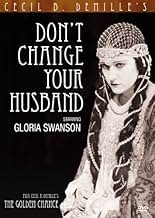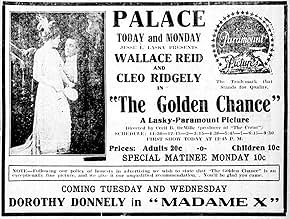While agreeing entirely with those who have expressed the opinion that "silent" DeMille is very much better than "talkie" DeMille, this particular film provides a very rare chance to also very directly compare EARLY silent DeMille with LATE silent DeMille. DeMille remade two of his silent films before the advent of talkies but in the othr case )The Indian Squaw) the second film is lost (although the third version, the talkie, survives). In this case, however, both silent versions survive, this film of 1919 and Forbidden Fruit, the 1921 remake.
Now neither is, I think, especially wonderful. The weaknesses of the melodramatic plot are the same in both cases. This film also suffers, as do many US films of around 1914-1915 from an overuse of close-up and lose medium shots (the recrudescence of the "facial"). The Cheat of the same year is, I think, a much better film. But it does have its good points and other reviewers have described these very well and it is, to my mind, a better film than the much gaudier and less believable Forbidden Fruit.
So why did DeMille's films decline in quality while he steadily became more famous and more acclaimed. It is not an absolutely straight line (there are some other good films throughout the silent period) but by and large DeMille films get worse as they go along and the reason I think is very clear to see. Throughout his career two elements characterise DeMille films - a great natural talent and a great and seemingly an equally naturally vulgarity and taste for whimsy, along with an understandable desire to please (very much indeed to develop a kind of "cinema of attractions" that is so falsely supposed to characterise earlier films. And as his career progressed, it was this natural vulgarity that increasingly got the upper hand. It made him in the end a popular film-maker (popular too with the studios) but not a good one and certainly not as good a one as, given the natural talent, he might have been.
In Forbidden Fruit for instance he inserts a "Cinderella fantasy" scene (a gimmick he had started to use in Male and Female and which became a sort of trademark). Yes, it is in a way effective as spectacle but it totally undermines any seriousness the film might otherwise have had. In the same way all the gritty elements of the film (particularly the marital violence) is all softened in the later film.

























